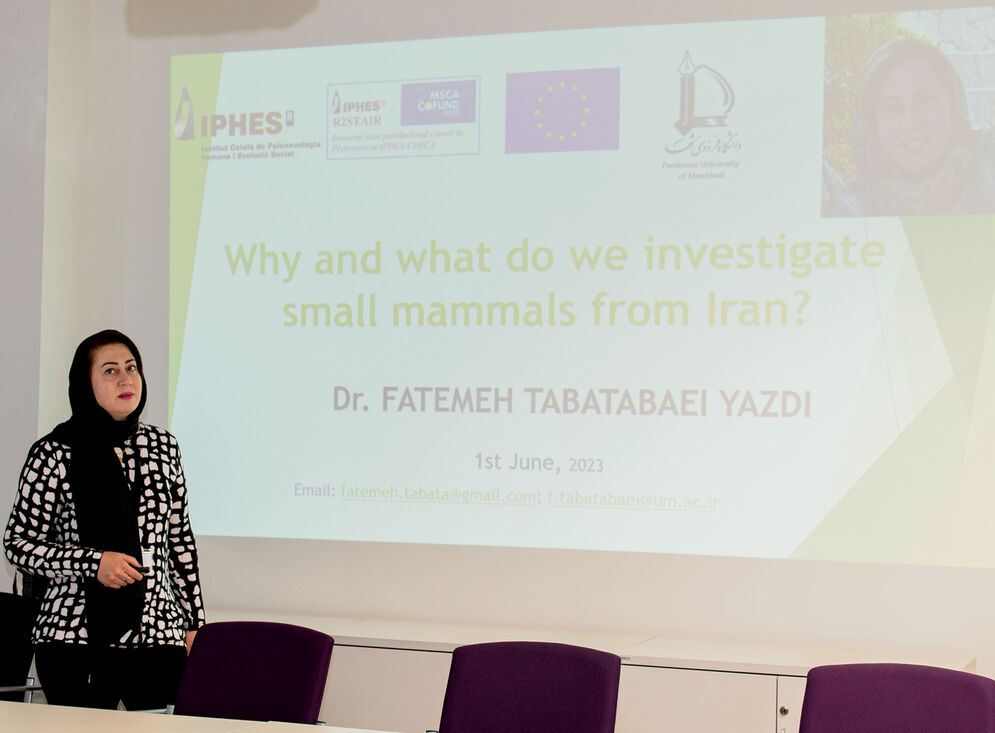Interview with Dr. Fatemeh Tabatabaei Yazdi from Ferdowsi University of Mashhad (Iran)
Dr. Tabatabaei Yazdi has stayed at IPHES-CERCA to analyze the role of rodents in archaeological sites
During May-June, IPHES-CERCA welcomed Professor Fatemeh Tabatabaei Yazdi from the Ferdowsi University of Mashhad (Iran) for a one-month research stay, framed in the PATH R2STAIR H2020-MSCA-COFUND-2020 programme led by Dr. Iván Rey Rodríguez, and supervised by Dr. Beatriz Gamarra.
During her research stay, Prof. Fatemeh Tabatabaei Yazdi worked closely with Iván Rey Rodríguez and gained more understanding on taphonomic investigation of pellets and rodent taxonomical identification. Also as part of her research stay, Prof. Fatemeh Tabatabaei gave a lecture entitled: "Why and what do we investigate small mammals from Iran?", in which she explained her current research lines at the Environment Department of Ferdowsi University of Mashhad.
This collaboration opened the possibility of sharing experiences in the investigation of rodents and, in particular, in geometric morphometric analyses, and kept the door open for planning possible future collaborations among the two institutions.
Also during her time at IPHES-CERCA, Prof. Fatemeh Tabatabaei Yazdi gave us a short interview giving us an insight of how it is to do science in Iran, particularly for women researchers. Read it below:
Prof. Fatemeh, can you tell us a bit about how a regular day at your workplace looks like?
Our working week is from Saturday to Wednesday, and these days we go to University from 8:00 a.m. to 2:00 p.m., sometimes until 4:00 p.m (Thursdays and Fridays are weekends). Like my other scientific colleagues, I am devoted to both educational and research activities. And as for the educational activities, I have about 10 compulsory teaching units that I teach three days a week; guiding students' theses and advising students are also among our duties. In this sense, I’d say it is similar to doing research in European universities.
Nonetheless, there are of course, differences to conducting research in Europe. Nowadays in Iran, it is very difficult to conduct excellent scientific research due to the sanctions of the United States of America and European countries. We are in trouble both in terms of budget and laboratory equipment and materials, as well as due to the limitation of high speed internet access. I remember that in November last year, because of low internet speed (and filtering from our government because of the revolution) it took me 11 hours to submit a scientific article and upload 5 images to a journal site. I almost burst into tears! Conducting scientific research and writing scientific articles and following up on its publication requires a strong will.
Prof. Fatemeh, what made you become a scientist?
I was (and still I am) interested in knowing about life sciences. I also love the scientific method: doing research and being curious to test hypotheses and achieve new findings - It’s something that I am very enthusiastic about, and, in a way, it keeps me dynamic.
Prof. Fatemeh, what would you say to a young girl who has interest in Science?
In Iran, and other traditional third world countries, society mostly expects girls to be, firstly, good mothers and wives, and then a researcher or anything else, but women have to pay a lot if they want to pursue a career in science.
In my opinion, pursuing a career in science makes the person a more knowledgeable, capable and deeper human being. Acquiring other skills, especially in the field of the Arts, can also make them strong and ready to face life's challenges, and turn them into conscious and knowledgeable mothers.
Nonetheless, as said before, pursuing knowledge nowadays in Iran is not an easy task and it requires a strong will.

